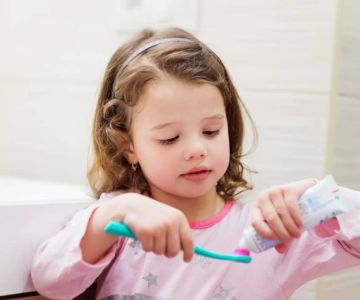1. Introduction: The Connection Between Oral Hygiene and Children's Health
As parents, guardians, and caregivers, ensuring the overall health and wellbeing of children is a top priority. While we often focus on nutrition, exercise, and mental health, one crucial factor that is frequently overlooked is oral hygiene. Oral health plays a vital role in a child's overall health and wellbeing, affecting both physical and emotional development. Poor oral hygiene can lead to a range of issues, from cavities to more severe conditions that can impact the quality of life.
In this article, we will explore how oral hygiene affects children's overall health and wellbeing, highlighting the importance of starting good habits early and how proper dental care can prevent numerous health complications. If you're looking for more guidance on maintaining your child's oral health, visit [Dentistry Toothtruth] for expert advice and services.
2. The Importance of Oral Hygiene for Physical Health
Children are especially vulnerable to oral health problems because their teeth and gums are still developing. Poor oral hygiene can lead to cavities, gum disease, and other dental issues that can affect a child's overall physical health. For instance, untreated cavities can result in tooth pain, difficulty eating, and even tooth loss, all of which can severely impact a child's nutrition and growth.
Studies show that children with poor oral hygiene are more likely to suffer from malnutrition due to the pain associated with eating. This can lead to developmental delays, including stunted growth, weakened immune systems, and reduced ability to concentrate in school. Proper brushing and flossing can help avoid these issues, promoting stronger teeth and healthier gums that support good nutrition.
3. Emotional and Psychological Impact of Poor Oral Hygiene
Beyond the physical effects, oral hygiene—or the lack thereof—also plays a significant role in a child's emotional and psychological development. Children with visible dental issues, such as cavities or crooked teeth, are often embarrassed about their appearance. This can lead to feelings of low self-esteem, anxiety, and even depression in some cases.
In addition, untreated dental problems can cause persistent pain and discomfort, which can lead to irritability, trouble sleeping, and a reduced quality of life. It's essential for children to feel confident in their smile, and good oral hygiene habits can help achieve that. Regular dental visits and timely treatment for any dental concerns are key to maintaining both physical and emotional health.
4. Oral Health and Long-Term Health Risks
Neglecting oral hygiene during childhood can have long-term consequences. Poor oral health has been linked to several chronic health conditions later in life, including heart disease, diabetes, and respiratory infections. Research indicates that the bacteria found in untreated cavities can enter the bloodstream, potentially leading to heart infections and other serious health conditions.
Moreover, children who experience dental pain or infections may develop a fear of dentists, leading to avoidance of dental care as they grow older. This can result in more severe oral health problems as adults. Starting children on a proper dental hygiene routine not only ensures healthy teeth and gums but also sets them up for a lifetime of good oral health and fewer health complications in the future.
5. How to Establish Healthy Oral Hygiene Habits in Children
Establishing a good oral hygiene routine for children can be challenging, but it's crucial for ensuring their long-term health. Here are some tips for teaching children the importance of dental care:
- Start early: Begin brushing your child's teeth as soon as their first tooth erupts. Use a soft toothbrush and fluoride toothpaste appropriate for their age.
- Make it fun: Make brushing and flossing a fun and interactive experience. Use songs, colorful toothbrushes, and rewards to encourage your child to keep up with their routine.
- Lead by example: Children are more likely to adopt good habits if they see their parents practicing them. Brush your teeth together to show them how it's done.
- Regular dental visits: Schedule regular check-ups with a pediatric dentist. Early visits will help establish a routine and prevent any issues from becoming serious.
- Healthy diet: Encourage a balanced diet with plenty of water, fruits, and vegetables, and limit sugary snacks and drinks that can lead to tooth decay.
6. Common Dental Problems in Children and How to Prevent Them
Even with the best oral hygiene habits, children can still face dental challenges. Some common dental problems include:
- Cavities: The most common dental issue among children, often caused by sugary foods and poor brushing habits. Regular brushing, flossing, and limited sugar intake can help prevent cavities.
- Gum disease: Plaque buildup can lead to gum infections, causing redness, swelling, and bleeding. Routine brushing and flossing are essential to prevent gum disease.
- Thumb-sucking and pacifier use: Prolonged thumb-sucking or pacifier use can affect the alignment of teeth. If the habit continues beyond age 3, consult a dentist for advice.
- Tooth sensitivity: Children can experience sensitivity to hot or cold foods. Using toothpaste designed for sensitive teeth can alleviate discomfort.
By understanding the potential risks and taking proactive measures, parents can help their children maintain excellent oral health and avoid these common dental problems.
7. Conclusion: The Importance of Good Oral Hygiene for Your Child's Overall Health
In conclusion, oral hygiene is not just about keeping teeth clean—it's about ensuring a child's overall health and wellbeing. Poor oral health can lead to a variety of physical and emotional problems, affecting a child's quality of life in both the short and long term. By establishing good dental habits early and seeking professional care when needed, parents can set their children up for a lifetime of healthy teeth and gums, and better overall health.
To learn more about oral health and get personalized dental care advice, visit Dentistry Toothtruth for expert recommendations and services tailored to your child's needs.






 Capital Dental Design - Richmond5.0 (456 review)
Capital Dental Design - Richmond5.0 (456 review) Gentle Smiles of Cherry Hill4.0 (190 review)
Gentle Smiles of Cherry Hill4.0 (190 review) Pura Dental Center Kingsbridge4.0 (498 review)
Pura Dental Center Kingsbridge4.0 (498 review) Mirshojae Mohsen DDS0.0 (0 review)
Mirshojae Mohsen DDS0.0 (0 review) Kenton Johnson, DDS5.0 (5 review)
Kenton Johnson, DDS5.0 (5 review) Smiles Divine Dental4.0 (25 review)
Smiles Divine Dental4.0 (25 review) The Importance of Oral Health Education During Pregnancy for a Healthy Pregnancy
The Importance of Oral Health Education During Pregnancy for a Healthy Pregnancy Best Tips for Brushing Your Teeth Properly for Healthy Gums: Essential Techniques for Oral Health
Best Tips for Brushing Your Teeth Properly for Healthy Gums: Essential Techniques for Oral Health Why Skipping Dental Checkups Can Lead to Bigger Oral Health Problems
Why Skipping Dental Checkups Can Lead to Bigger Oral Health Problems Advantages of Porcelain Dental Restorations
Advantages of Porcelain Dental Restorations How Can Diabetes Cause Tooth and Gum Problems? Preventing and Managing Oral Health Issues
How Can Diabetes Cause Tooth and Gum Problems? Preventing and Managing Oral Health Issues Healthy Habits for Promoting Good Oral Health and Hygiene: Tips for a Healthy Smile
Healthy Habits for Promoting Good Oral Health and Hygiene: Tips for a Healthy Smile